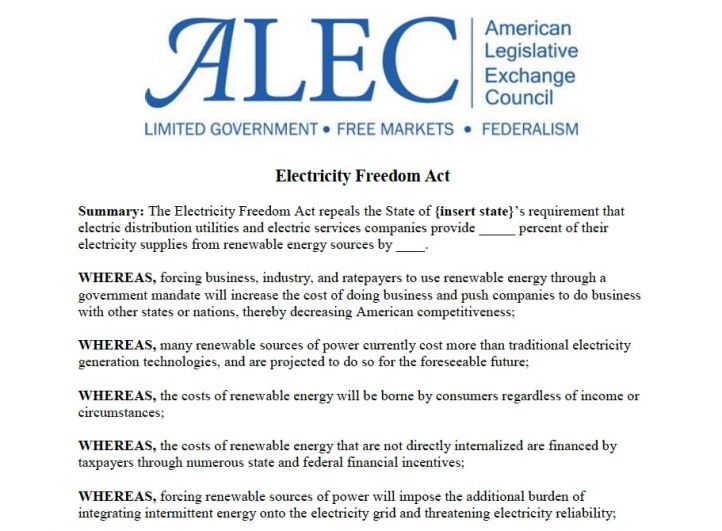Distributed renewable energy is a threat to fossil-fuel-based utilities and industries. The more clean energy consumers produce, the fewer assets utilities get to add and the less energy gets sold. It turns the utility model upside down.
It would be naive to think that these incumbent forces would not push back, hard, against renewable energy on the frontlines and in back rooms.
Look at ALEC, the American Legislative Exchange Council, to observe one way that entrenched interests are fighting back.
With almost 2,000 state legislators as members, ALEC describes itself as the “state legislators’ think tank" and "nonpartisan." Despite its nonpartisan claim, the board is made up almost entirely of Republican and Tea Party-associated legislators.
ALEC produces "model bills" for its members to take back to their respective state houses. The issue is that ALEC is funded by firms such as Koch Industries and Exxon Mobil, according to tax documents acquired by Bloomberg News in legislation involving carbon pollution. Peabody Energy, the world's largest private coal company, is an underwriter, as is Duke Energy, according to The Center for Media and Democracy.
ALEC opposes renewable portfolio standards (RPS) and suggests that free markets, rather than mandates, should steer the energy sector.
In addition to opposing RPS, ALEC blocks climate change legislation, and as reported in ALEC Exposed, has crafted legislation to block the EPA from regulating coal ash.
But First, The Snitchler Report
When we last reported on Ohio Public Utilities Commission (PUC) Chairman Todd Snitchler, he had come under fire for the anti-green nature of his Twitter feed, and Ohio solar was in the news because Snitchler's PUC had just put an end to the 50-megawatt Turning Point solar project in a 3-to-1 vote. The vote was counter to the advice of the commission's staff.
It turns out that Todd Snitchler has ties with ALEC, according to the AP report. Snitchler was a keynote speaker at an ALEC task force meeting and attended other meetings between 2009 and 2011. Attendance records were obtained by ProgressOhio, a liberal policy group.
Prior to joining the PUC, Snitchler received more than $25,000 in contributions from electricity, natural gas, phone and transportation sectors.
Snitchler regulates those sectors now.
ALEC's RPS-Killer: The "Electricity Freedom Act"
Todd Wynn, the head of ALEC's Energy, Environment and Agriculture Task Force, was quoted by the AP as saying, "[The council] has always been opposed to energy mandates, but in 2012 we picked up the debates on renewable energy targets specifically."
That decision emerges from ALEC as a "model bill" called the "Electricity Freedom Act," which seeks to repeal the Renewable Portfolio Standards now in place in 29 states and D.C.
Legislators are free to take this model bill, written with help from the vehemently libertarian Heartland Institute, and attempt to foist it on their home states. It has been suggested that the Arizona Renewables Massacre was ALEC-inspired.
ALEC's corporate underwriters have deep pockets, political savvy, and come prepared for the long fight. Solar and renewable energy industries had best be similarly prepared.
Here's a graphic on ALEC's model legislation process from ALEC itself.




